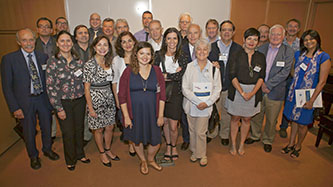Noted International Chemist Was One of Brooklyn College's Own
August 25, 2016
On August 19, a symposium was held in memory of former Brooklyn College chemistry professor Roberto Sánchez-Delgado. Known for his groundbreaking work in organometallic chemistry and key role as a weapons inspector for the United Nations, Sánchez-Delgado passed away on December 13, 2015, after a prolonged battle with renal cancer.
The daylong event, organized by a committee that included Brooklyn College Associate Professor María Contel, Assistant Professor Mariana Torrente, and Alberto Martínez, assistant professor at New York City College of Technology, focused on organometallic chemistry, Sánchez-Delgado’s primary field of research. The professor’s sister Beatriz, wife Victoria Medialdea, their daughter Eugenia, and more than 20 scientists and professors from institutions worldwide made presentations at the symposium in front of a crowd of nearly 100 students and scientists at the Woody Tanger Auditorium.
“Roberto convinced me to move to the U.S. to establish my own research group in 2005,” said Contel in her opening remarks. Thanking Sánchez-Delgado’s widow, for attending the event, Contel, said she never regretted following his advice and joining Brooklyn College in 2007.
“On his arrival at Brooklyn College, we went through similar stages of academic life together, sharing ideas and supporting each other in our applications for promotion and grant funding,” said chemistry Professor Alexander Greer, who together with department colleagues Professor Richard Magliozzo and Assistant Professor Ryan Murelli, helped organize the event. “He provided insightful feedback to drafts of grant applications despite his illness, for which I will always be grateful,” Greer added.
Born in Caracas, Venezuela, to a family of lawyers, Sánchez-Delgado enrolled in the Imperial College of Science and Technology in London to study under Sir Geoffrey Wilkinson—who received the Nobel award in chemistry in 1973 for his work on organometallic compounds—and became acquainted with scientists who would become his lifelong friends and colleagues.
Upon returning to his country, Sánchez-Delgado joined the faculty of the Venezuelan Institute of Scientific Research (IVIC) in 1977, and became its deputy director in the late 1980s. In 1989 he was awarded the “Orden Francisco Miranda” by the Venezuelan government for his research. He also received a John Simon Guggenheim Fellowship in 1988, and the Venezuelan National Prize in Science in 1991.
Thanks to his reputation as a meticulous researcher, Sánchez-Delgado was asked to join the United Nations weapons inspections team after the first Gulf War of 1991, to ensure that all weapons of mass destruction had been destroyed. On the eve of the Iraq War in 2003, Sánchez-Delgado reportedly told several of his colleagues and friends, including David Cole-Hamilton, a professor of the University of St. Andrews who works on organometallic chemistry, that it was impossible that Iraq could have rebuilt the weapons program in such a short time, disputing prevailing beliefs.
Given Venezuela’s political instability in the 1990s, Sánchez-Delgado decided to leave and joined the Brooklyn College Department of Chemistry in 2004. He soon became the chair of the inorganic chemistry subdiscipline at the CUNY Graduate Center. An accomplished scholar who authored 125 articles, Sánchez-Delgado was also a caring mentor and highly regarded instructor who was honored with a Claire Tow Distinguished Teacher Award in 2012.
According to Julio Urbina, an emeritus researcher at IVIC who did some research with Sánchez-Delgado, “Roberto was a man with a profound intellectual curiosity and was passionate about the biochemistry and biophysics of parasitic diseases.”
His seminal work with the element ruthenium to combat the tropical disease known as Chagas, eventually led him to use that same metal to develop medicinal compounds to fight chloroquine-resistant malaria, other parasitic diseases, and cancer. Hailing from one of the world’s major oil producers, Sánchez-Delgado was keen on finding a catalytic solution to clean emissions from fossil fuels derived from heavy petroleum.
“For him, science was never too far from the political,” said Professor Julio Urbina, a former colleague and an emeritus investigator at the Venezuelan Institute for Scientific Research in Caracas.
“He taught me to believe in myself,” said Chevron USA’s Francisco López Linares, a former Venezuelan student at the research institute who remembers that Sánchez-Delgado insisted that students read Alice in Wonderland and compare each episode in Lewis Carroll’s book to the marvels of chemistry. “An extraordinary supervisor, supporter, and friend, Roberto always had time for his students and always told you that he expected the very best from you.”







